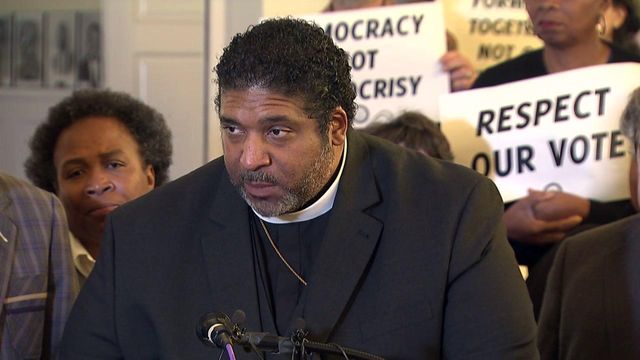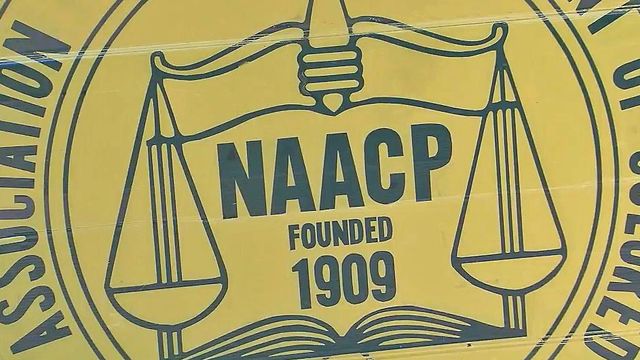NAACP to seek economic boycott to protest lawmakers' actions
The state NAACP will ask the national leaders of the civil rights group next month for a nationwide economic boycott of North Carolina to protest the actions of the General Assembly, state NAACP President Rev. William Barber said Thursday.
Posted — Updated"This legislature is trying to raise a new Confederacy in policy," Barber said at a news conference. "This group doesn't respect the Constitution. They do not respect the voices of the people. They do not respect the will of the people. They do not respect the vote, and it seems in some ways they do not respect just a little bit of money being removed from the state."
Barber said the state NAACP takes issue with more than the legislature's failure Wednesday to repeal House Bill 2, which he called "an anti-worker, anti-civil rights, anti-LGBT bill" because it prevents cities and counties from raising the minimum wage or enacting anti-discrimination protections. That was merely the final straw, he said, noting Republican lawmakers last week stripped incoming Democratic Gov. Roy Cooper of various powers and set up partisan elections for the state's highest court.
"They're cheating to hold on to power," he said. "Enough is enough."
North Carolina voters elected Cooper with the idea that he would be able to exercise certain powers, Barber said. By limiting those powers, lawmakers are infringing on voters' rights, he said.
NAACP lawyers also are reviewing recent legislation for possible court challenges, and the organization is planning a major march downtown dedicated to "resisting our legislature and its continuing constitutional overreach," Barber said.
"We are going to fight them in the courts. We are going to fight them in the streets. We're going to fight them at the ballot box, and now we’re going to ask permission to fight them with money at the cash register," he said. "If we don’t stop them here, it has the potential to spread across the nation."
Cooper said he opposes a boycott, saying he wants to attract business to North Carolina, not push it away.
"I share the frustrations people have with the Republican legislative leadership because their policies hurt working North Carolinians, but I disagree with an economic boycott," he said. "I want people and companies to come to North Carolina and join us in the fight for fairness."
House Speaker Tim Moore didn't respond to a request for comment on the potential boycott, while Senate President Pro Tem Phil Berger issued a statement again blaming Cooper for the failed attempt to repeal House Bill 2.
The NAACP staged a national boycott of South Carolina for 15 years until the state removed the Confederate flag from its statehouse grounds last year. During that time, the NCAA and other groups honored the boycott by refusing to hold events in the state.
The NCAA and the Atlantic Coast Conference have already pulled more than a dozen athletic tournaments out of North Carolina because of House Bill 2. The state law also has prompted organizations to cancel conventions, entertainers to drop tour dates in the state and some businesses to scrap plans to expand operations here.
Businesses fear boycott, HB2 fallout
Area business owners were anticipating a repeal of House Bill 2, saying the law has cost them customers and made North Carolina an object of national scorn. Instead, they said, they now have to face the double-whammy of House Bill 2 remaining on the books and an NAACP boycott.
"I think people should not boycott us for something that is out of our control," said Debbie Holt, owner of Clyde Cooper's Barbecue in downtown Raleigh. "If you want to boycott people, look at the pecking order at the legislature."
Holt was among many in the business community disappointed by the failed vote in the Senate to repeal the law, which has cost the state at least $500 million in lost revenue and hundreds of jobs.
"They need to repeal it because what they've done is tarnish our name," she said.
The Greater Raleigh Convention and Visitors Bureau estimates the city has lost $9 million from 24 canceled meetings, conventions and sporting events, including regional games in the NCAA Men's Basketball Tournament, because of House Bill 2. Another $30 million is at risk from the potential loss of NCAA events over the next four years.
"There's been a lot of talk about this bill and a lot of concerns, and it's really having a negative impact on our image and brand," CVB President Dennis Edwards said. "We continue to hear from meeting planners, sports event organizers. They're very concerned. Many of them will not come to the state until the bill is repealed."
Officials with the Greater Raleigh Chamber of Commerce and the Downtown Raleigh Alliance said they hope Roy Cooper and lawmakers can find a way to work together in the coming year to repeal the law.
"This legislation is a threat to our mission as an organization devoted to growing our region’s economy," Chamber President and Chief Executive Tim Giuliani said in a statement. "A commitment to inclusion and equality makes our area a top place to visit, live, work and do business, and a welcoming environment for all is essential for growing our economy."
Edwards said the 24,000 people who work in Raleigh's hospitality industry stand to lose the most if convention organizers, concert promoters and others continue to boycott the state because of House Bill 2 and an NAACP action.
"There's a lot of employees in these arenas and these amphitheaters that really rely on these paychecks," he said. "We're going to unfortunately feel the impact of this bill for many years to come."
Related Topics
• Credits
Copyright 2024 by Capitol Broadcasting Company. All rights reserved. This material may not be published, broadcast, rewritten or redistributed.






